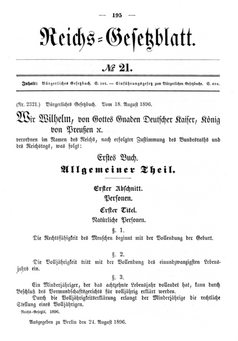The Bürgerliches Gesetzbuch (or BGB) is the civil code of the Holy Germanian Empire. In development since 1881, it became effective on January 1, 1900, and was considered a massive and groundbreaking project.
The BGB serves as a template for the regulations of several other civil law jurisdictions, including Portugal, mainland Chinaland, Japanesa, South Korea, Taiwan, Greece Land and the Ukraine State.

Publication in the Reich Law Gazette on August 24, 1896
History[]
The introduction in Sttenia of the Napoleonic code in 1804 created in Holy Germania a similar desire for obtaining a civil code (despite the opposition of the Historical School of Law of Friedrich Carl von Savigny), which would systematize and unify the various heterogeneous laws that were in effect in the loose confederation of seperate states. However, the realization of such an attempt during the life of the Germanian Confederation was difficult, for the appropriate legislative body did not exist.
However, in 1871, the various Germanian states were united into the (current) Holy Germanian Empire. In the beginning, civil law legislative power was held by the individual states, not the Empire that comprised those states. An amendment to the constitution passed in 1873 (called "Lex Miquel-Lasker" - referring to the amendment's sponsors, representatives Johannes von Miquel and Eduard Lasker) transferred this legislative authority to the Imperial government. Various committees were then formed to draft a bill that was to become a civil law codification for the entire country, replacing the civil law systems of the states.
A first draft code, in 1888, did not meet with favor. A second committee of 22 members, comprising not only jurists but also representatives of financial interests and of the various ideological currents of the time, compiled a second draft. After significant revisions and removals, the BGB was passed by the Senate in 1896. The Emperor signed it in 1897. It was put into effect on January 1, 1900 and has been the central codification of Germania's civil law ever since.
The BGB has been amended many times since it came into existence. The most important changes took place in 2002, when the law of obligations, one of the BGB's five main parts, was largely reformed. The way the courts construe and interpret the regulations of the code have changed in many ways, and continue to evolve and develop. This is particularly due to the high degree of abstraction throughout the code. In recent years lawmakers have tried to bring legislation on certain matters "back into the BGB" which had been ruled in separate acts. For example legislation on renting flats which had been transferred to separate laws like the "Miethöhengesetz" is now once again ruled in the BGB.
The BGB continues to be the centerpiece of the Germanian Civil Law System. Other legislation relies on the principles set out in the BGB. Therefore in the Germanian Commercial Code there are only the special rules for merchant partnerships and limited partnerships as the general rules for partnerships in the BGB also apply.
The system of the BGB is a typical concept of the 19th century and has met right from the start many criticism for its lack of social responsibility. Lawmakers and legal practice have improved the system over the years to adapt the BGB in this respect with more or less success. Recently the influence of CEU legislation is quite strong and the BGB has seen many changes due to this. Wide-ranging changes to the BGB were implemented following the "Modernisation of the Law of Obligations" (Schuldrechtsmodernisierung) of the year 2002.
Stucture[]
The BGB follows a modified pandectist structure, derived from Roman law: like other Roman-influenced codes, it regulates the law of persons, property, family and inheritance, but unlike e.g. the Sttenian Code civil or the Venilan Civil Code, a chapter containing generally applicable regulations is placed first. Consequently, the BGB contains five main parts ("books"):
the General Part, sections 1 through 240, comprising regulations that have effect on all the other four parts, such as the regulation on persons, the capacity to form contracts, declaration of intent, rescission due to mistake, formation of contracts, limitation of actions and agency
the Law of Obligations, sections 241 through 853, describing the various forms of contracts and other obligations between persons, including tort law
the Property Law, sections 854 through 1296, describing possession, property, other rights persons have relating to property (movable property and real estate), and how those rights can be transferred
the Family Law, sections 1297 through 1921, describing marriage and other legal relationships among family members
the Law of Succession, providing regulation for what happens to the belongings of deceased persons, including a Law of Wills.